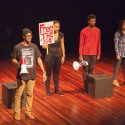Bamuthi helps UW speak to the hip-hop generation

Marc Bamuthi Joseph will conclude his residency with a farewell performance at 7:30 p.m. on Monday, April 30, at Music Hall.
Photos: Jeff Miller
On stage, Marc Bamuthi Joseph is a poet, a dancer, an actor and a musician. At home, he is a loving father, a devoted boyfriend and a loyal friend. As an artist in residence at UW–Madison this semester, Bamuthi is also what he most wants to be — a teacher.
“I am a hip-hop educator, which means that the pedagogical approach I take to the classroom is integrally informed by hip-hop culture and aesthetics,” he says. “My work doesn’t have very much meaning if it’s not rooted in the community.”
Bamuthi is an internationally renowned spoken-word and hip-hop theater artist who combines a variety of art forms, including tap dance, poetry and live music into his dynamic stage performances. Often making social and political commentary with his work, he has appeared on HBO and Broadway and was an inaugural recipient of the United States Artists Rockefeller Fellowship.
Using his performance background as a teaching tool, Bamuthi challenges his students “to deconstruct hip hop from historical, political, educational and artistic viewpoints so as to create a vision of what performance might be like in the 21st century.” As baby boomers start to retire, he says, so will their values, slowly being replaced with the vision of the hip-hop generation.
“This course is what hip-hop scholars personify as the ‘verse of our times,’” freshman Martinez White says of Bamuthi’s class. “It speaks to my spirit, philosophies and ideological beliefs and aspirations. I took this course to learn more about myself, the world around me and my generation.”
Taylor Franklin, a graduate student in art education, also closely identifies with the course material.
“There is a new realization uncovered in every discussion, and the vernacular, attitude and approach to the learning process is raw, in-the-moment and relevant to our society today,” she says.
Teaching hip-hop culture in a university setting is a very new phenomenon, and UW–Madison has emerged as one of the leaders in this movement. The Office of Multicultural Arts Initiatives (OMAI), one of the residency’s sponsors, is the only office of its kind on any college campus, making Bamuthi’s time here even more significant.
“This is really a major climate-changing course,” says Willie Ney, executive director of OMAI. “The students feel totally empowered by Marc Bamuthi Joseph, letting them use their own voices and experiences and be totally free in the classroom.”
In addition to the three-credit course, housed in the Department of Afro-American Studies, the residency also included the public lecture and performance series “Line Breaks.” Featuring nationally recognized spoken-word artists and other performers every Monday night, the series brought in more than 2,000 people, with standing-room-only crowds on multiple occasions.
Although Bamuthi did not choose to host the series at the Wisconsin historical society, the venue added yet another layer to the impact of his residency.

Jarvis King performs a piece during a spoken-word class
taught by Marc Bamuthi Joseph. During the class, Bamuthi described a series
of situations and then asked the students to write down their related memories
and experienced emotions. The students were then challenged to develop and
present a spoken-word performance using just these words and phrases.
“One of the ideas that we’re preaching is the notion of a living history, a living word, so placing this residency at the Historical Society definitely promotes the idea that people can make history,” he says. “This community may not get a sense of what’s happening now, but 25 years from now, 50 years from now, it will totally be evident that we are experiencing a historical moment.”
Bamuthi will continue to influence campus long after his residency ends next month. Many of his students will be involved with OMAI initiatives in the future, which include Youth Speaks Wisconsin, a spoken-word partnership among the university, community and local schools, and the First Wave Spoken Word and Urban Arts Learning Community, another first-of-its-kind program at any university.
Ney hopes that residencies like these will affect not only his multicultural-focused programming but also the campus at large.
“There is a need for more diverse faculty that can engage the new generation of youth, which will help attract a more diverse student body,” he says. “If we want to be a leader in multiracial recruitment, and I think we can be, we need to bring faculty that can really engage these kids culturally.”
The campus community and Bamuthi’s students have learned a lot from him, but they have also taught him many lessons in return.
“I’ve learned how to shift shape. I’ve learned that fear is useless. I’ve learned that you can be male and hip hop and feminist. I’ve learned to keep my eyes wide open. And I’ve been reaffirmed in the fact that students need to be reaffirmed, that language is not dead and that it’s so important to support young people in their endeavor to keep language living.”
Bamuthi will give a farewell performance at 7:30 p.m. on Monday, April 30, at Music Hall. The show will also feature performances by students from his class and the Youth Speaks Wisconsin finals team, with all proceeds benefiting the First Wave Scholarship Fund.
For more information on Bamuthi, his residency, and his final performance, visit
http://www.arts.wisc.edu/artsinstitute/air/joseph/.



